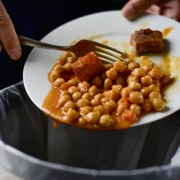In This City, Blockchain is Now Helping to Alleviate Hunger and Reduce Waste
Consumers throw away about 133 billion pounds of food every single year. And while it is up to each consumer to decide what to do with their food after it is purchased, how many of us would be willing to donate it if there was a simple way of doing so? Luckily, the Goodr is revolutionizing the way we approach food waste.
Years ago, Jasmine Crowe began hosting pop-up dinners for the homeless in Atlanta, Georgia. As someone who experienced food insecurity firsthand, Crowe wanted to do what she could to make sure this didn’t happen to others. And she is doing this entirely on her own without the government’s help.
Crowe said:
“Having experienced that first hand really shifted perspective for me, because for years I was feeding members of our homeless community. I didn’t understand that the face of hunger was readily changing.”
But in addition to feeding the hungry, the app also helps address the fact that food waste accounts for 27 percent of our landfills. People were so touched by her story and her mission that a video about Crowe’s work went viral in 2016.
Many viewers wanted to know how Crowe was able to provide enough food to feed all her guests. Individuals wrote to her asking which restaurants she had partnered with but in reality, Crowe was supplying most of the food by simply asking for donations from others. She commented on this saying, “And the reality was that no restaurants donated the food. I literally was just taking volunteer donations and spending sometimes my last money to make these things happen.”
But Crowe knew there must be an easier way to do this. In 2017, she developed an app called Goodr that helps connect businesses with extra food to local nonprofits who specialize in feeding the homeless or others who are struggling to afford sustenance. But the app’s functions do not simply end there.
Everybody Wins
Whether it be a restaurant or catering company, businesses that routinely find themselves with extra food are also wasting money, and this is a problem that needs to be solved in order to run as efficiently as possible. And by using Goodr, companies are also getting a consultation on how they can reduce waste.
As reported by CNBC:
“The company uses blockchain to keep a data ledger for their clients of how much food businesses waste, and where they might be losing money. Data collected by the company includes information on what food gets wasted the most, community connections and environmental impacts.”
Goodr is able to earn money and sustain its model by charging the restaurants to use its service. Since the restaurants are also able to potentially save by estimating their waste, everyone wins, including those who are the recipients of the free food.
“Our hope is definitely like most social good companies, is that we’re able to work ourselves out of business,” Crowe said. Additionally, Crowe has garnered additional funding by participating in local and national business accelerators competitions. According to Fast Company:
“So far, she’s used local and national business accelerators and incubation competitions to bootstrap capital. That includes winning the United Way Spark Prize for $15,000 in funding, and Miller Lite Tap the Future contest for another $21,000, among other top finishes. In February 2018, Goodr was accepted into the virtual accelerator Techstars Anywhere and continues to work on how to expand and grow revenue.”
Crowe once commented that “hunger is not a scarcity issue. There’s more than enough food. It’s actually a logistics issue.” Luckily, Crowe has found a way to solve this problem while helping to reduce waste at the same time.
Jasmine Crowe is showing all of us that one individual is capable of making a huge impact. And by utilizing blockchain technology, Crowe’s fight to end hunger has become an unstoppable force. Since Crowe launched the app, 900,000 pounds of food have been diverted from landfills and have instead provided about 850,000 meals to those in need. While Goodr is currently restricted to the Atlanta area, Crowe hopes to branch out and expand her services Seattle, Chicago, Los Angeles, Washington D.C., Miami, Dallas, Houston and San Francisco by the end of 2019.




